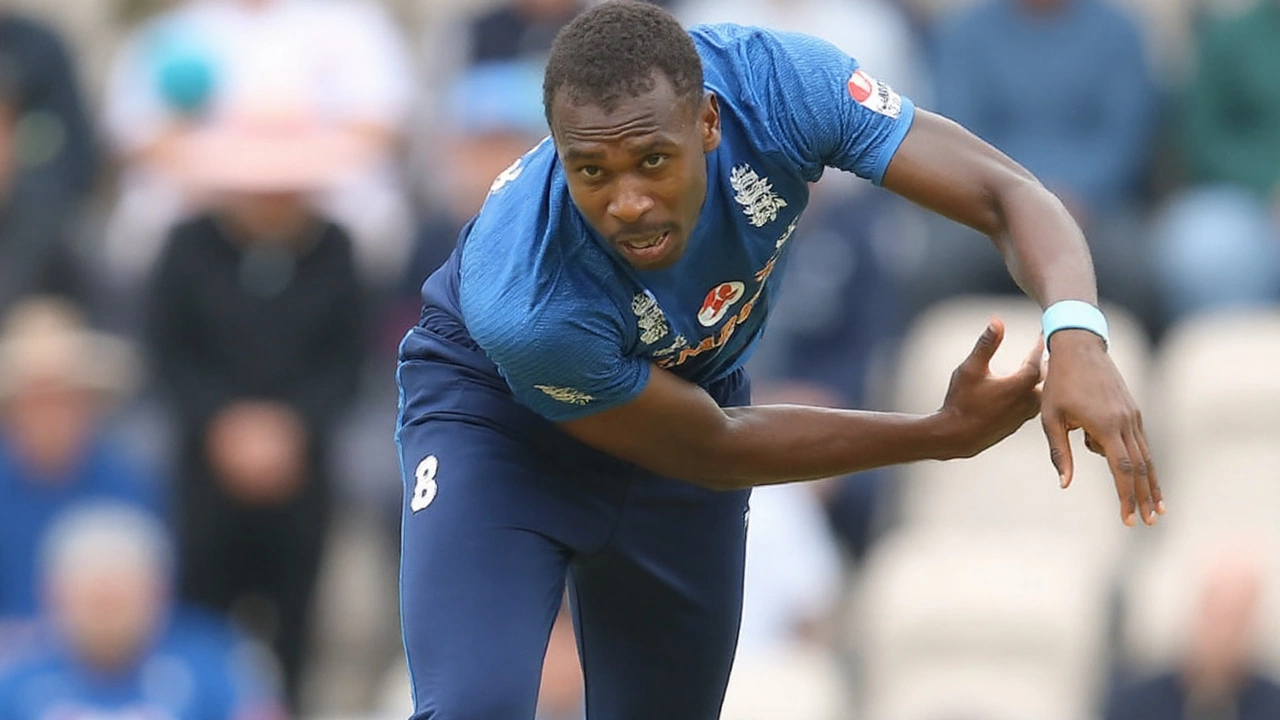Jofra Archer hailed as 'box office' by McCullum ahead of Ashes he calls the biggest series

McCullum backs Archer as the Ashes pace spearhead
England wanted a statement from their quickest bowler. They got it in nine and a half overs. Chasing 415, South Africa crumbled to 24 for 6 as Jofra Archer ripped out four wickets for 18. Brendon McCullum stood on the boundary and called it what everyone felt: box office. The England head coach didn’t dress it up. He said Archer has got quicker, the ball is moving both ways, and the bounce is mean. In short, you didn’t dare look away.
“That was an unbelievable spell. Huge,” McCullum said after the match. “It was box-office bowling… you didn’t want to miss a ball.” He wasn’t only talking about raw pace. Archer’s wrist stayed strong through the seam, the ball wobbled late, and batters looked jammed on the crease. It was the kind of rhythm Archer had in 2019 when he burst into international cricket and stole big moments for fun.
England have been careful getting him here. Archer’s stop-start years with elbow trouble taught them to be patient. They’ve capped workloads, planned spells, and picked their spots for competitive overs. McCullum called him a "proper cricketer" and said the management has “taken our time with him” with one target in mind: the Ashes in Australia. He calls it “the biggest series of all of our lives,” and he wants Archer fully loaded.
The calendar is locked in. Five Tests in Australia: Perth (Nov 21–25), Brisbane (Dec 4–8), Adelaide (Dec 17–21), Melbourne (Dec 26–30), and Sydney (Jan 4–8). Each stop asks a different question of fast bowlers. Perth rewards chest-high bounce if you hit the splice. Brisbane rewards control that nips just enough. Adelaide, under lights, turns late evenings into a seam-bowling audition. Melbourne needs patience on a big, flat stage. Sydney can drift toward spin, but good quicks still crack it open with old-ball reverse and clever fields. Archer’s skill set fits that map.
McCullum spoke as if the plan has been months in the making. Archer has been kept in the firing line on this South Africa tour to keep the engine hot, while other players have been given the week off. England rested Ben Duckett and Jamie Smith from the current T20s to save mileage for Australia. Archer stays on the park to bank rhythm. “It’s always a delicate balance,” McCullum admitted. “Sometimes you need to keep bowling and you need to keep ticking over.” That’s the path they’ve chosen for their quickest asset.
So, what does Archer offer in Australia beyond the speed gun? It’s the bounce that changes batting plans. Australian surfaces reward a hard length that forces mistakes around the glove and splice. Archer sits there ball after ball, then surprises with a fuller one that brings lbw and bowled into play. When the Kookaburra softens, he’s shown he can wobble the seam and still find movement. And when a game stalls, he’s the one who can blast through a set batter with one over that takes the air out of a stadium.
If you want a window into McCullum’s thinking, it’s right there in the word choice. “Box office” is more than hype. It’s about timing and presence. Archer draws eyes, unsettles dressing rooms, and gives captains license to attack. In Australia, that edge matters every session. Fielders walk in a step tighter. Catchers lift. Batters second-guess the pull and hook. That is how away Ashes are won: through small waves of pressure that become a current.
There’s also the memory bank. Everyone remembers Lord’s in 2019, when Archer’s bouncer rattled Steven Smith and changed the temperature of an Ashes summer. Different year, different series, but the feeling is the same: when Archer is fit and fast, England carry a different threat. McCullum, who built his teams on intent, sees the same force multiplier.
Fitness is still the watchword. England won’t say it out loud, but they’ll be measuring everything — overs in the legs, spikes on grass, recovery markers between spells. The Ashes schedule includes short turnarounds and long flights. That demands rotation, even for the spearhead. Expect spells to be short and hot, new-ball bursts to set the tone, and brief stints late in the day under lights in Adelaide. The idea is to keep Archer fresh enough to deliver a handful of game-shaping overs across five Tests, not just one or two.
Selection will orbit around him. Who takes the new ball with Archer in Perth? Do England want another hit-the-deck quick or a metronome who hammers the top of off? How many overs do they ask from the allrounders to cushion the seamers at Melbourne and Sydney? These are choices McCullum and his staff are clearly parking until closer to each Test. But everything points to building the attack around Archer’s ability to shock and then control.
That’s not to say England are going all-in on pace alone. They know Adelaide and Sydney can turn into long days for quicks if lines slip. Expect a balanced squad: swing early, bounce through the middle, spin to tie ends and hunt with footmarks later. Archer’s role sits across those phases: bruising short spells that break partnerships, then steady overs that keep runs in check when the ball stops talking.
England’s selection dance and Jacob Bethell’s rapid rise
McCullum’s player management has been blunt and clear. Duckett and Jamie Smith, both part of England’s red-ball core, have been rested from parts of the ongoing T20 leg against South Africa. The goal is obvious: protect workloads before a long haul to Australia. At the same time, they’ve asked Archer to keep playing to maintain feel. Bowlers say form lives in your fingers; the staff seem to believe it.
That split approach tracks with how England have handled multi-format tours lately. They stagger workloads. Batters get mental breaks. Keepers rotate to save the back and knees. Fast bowlers either bowl or don’t — what they avoid is the half-measure of heavy nets without match adrenaline. Archer’s 4 for 18 shows why match overs matter. Timing at the crease, rhythm at the top of the mark, and a good read on lengths — these live reps are hard to fake.
Beyond the headline act, McCullum took time to spotlight 21-year-old Jacob Bethell. The coach sounded proud, not just pleased: Bethell’s first professional hundred came in an England shirt. That’s a real marker for a young player. Bethell has risen fast through age-group cricket with a fearless style — front-foot drives, strong through midwicket, and a willingness to take the game on. He fields with bite and offers useful spin when needed. England like that profile because it fits their tempo: brave, proactive, and able to change a day in a session.
Development for Bethell will be about tempo control. International cricket speeds everything up — the ball zips faster, the fields set earlier, and bowlers hide their plans better. McCullum’s message was protective: celebrate the milestone, then pace the climb. A first hundred in national colors is fuel, not a finish line. England will likely use him in roles that keep his instincts sharp while giving him guard rails — powerplay options in white-ball games and middle-order tests where strike rotation matters.
This all folds into a broader Ashes blueprint. England want hitters of moments, not just accumulators of minutes. They’ve leaned into aggression since McCullum took over, but they’ve also learned when to slow down. In Australia, over-attacking can chew through resources on lifeless afternoons. That’s where selection balance and role clarity help. Archer’s presence lets England attack without gambling every over. With his pace setting fields back, others can nibble at the stumps and build pressure.
There will be questions they can’t answer until the first Test starts in Perth. How will Archer pull up after day one spells in heat? What does the second new ball do at the Gabba after 80 overs baked in Brisbane sun? Does Adelaide under lights swing too much to ignore a longer burst from him? Those are good problems to have because they assume something vital — that Archer is fit, available, and bowling quickly.
McCullum’s tone suggests belief is back in the dressing room. “He’s going to be a huge player when we get to Australia,” he said, looping back to the “box-office” tag. It’s more than a compliment. It’s a signal to the group and to Australia: England think their quickest bowler is ready for the stage. If the spell against South Africa is any guide, the trailer has already dropped. Now we wait for the premiere in Perth.
